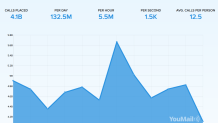If it seems like your phone is ringing less often these days with calls from unknown numbers, it's not just you.
YouMail, a robocall-blocking app maker based in Irvine, says it's tracked a distinct scam call decline in its analysis of billions of phone calls. The trend appears to coincide with the spread of the coronavirus that causes COVID-19.

YouMail says illegal robocallers made about 2 billion calls to Americans in February. That number fell to about 1.65 billion in last month, a 17 percent drop.
"While March's decline provides welcome relief to beleaguered consumers, it's unlikely to last given the decline appears to be driven by the impact of COVID-19 social distancing restrictions on call centers," YouMail CEO Alex Quilici said in a news release. "It's a shame it has taken a global pandemic to make a real dent in the robocall epidemic."
Quilici elaborated on the coronavirus impact in an interview with NBC Bay Area.
“Many of those calls were coming from overseas, and some of these countries overseas have had very severe lockdowns," Quilici said. "They don’t have the infrastructure that enables people to do a call center position, but do it from home.”
Local
The San Francisco Bay Area remained in YouMail's top ten list of U.S. major metropolitan areas for robocalls. It, too, saw a sharp drop in illegal robocall activity for March. The top scam call identified by YouMail involves impostors pretending to be PG&E and shaking down residents with the threat of an immediate power cut-off. As NBC Bay Area previously reported, PG&E will never call and demand payment in this manner.
Unsurprisingly, YouMail found the most common type of illegal robocalls in March were medical and health-related schemes and scams, comprising about 402 million calls. Some of those calls include fraudulent promises of COVID-19 cures or tests, as well as callers posing as doctors or government agents, seeking private information from unsuspecting victims.
NBC Bay Area recently spoke to one such robocaller, who was promising a COVID-19 medicine. Click here to listen in.



